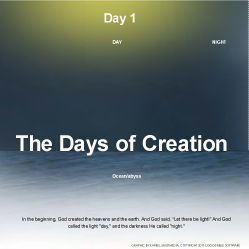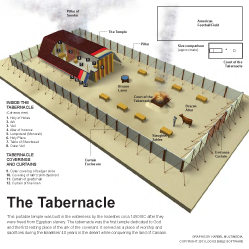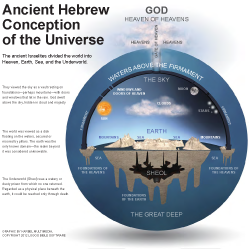104:1–35 In this praise psalm, the psalmist explores Yahweh’s work in creating and sustaining the world. The psalmist intertwines these two emphases, indicating that Yahweh continues to support the world because He made it in the first place. The psalmist begins by praising Yahweh for His splendor and majesty (vv. 1–4). He then describes Yahweh’s work in creation (vv. 5–9). As he praises Yahweh for sustaining creation, he turns specifically to Yahweh’s work in providing water (vv. 10–13), fertility for crops (vv. 14–15), and dwelling places for animals (vv. 16–18). He describes Yahweh’s power over the sun and moon (vv. 19–23)—which were often worshiped as gods in the ancient Near East—and shows how creation reveals Yahweh’s glory (vv. 24–26). He then praises Yahweh’s provision again (vv. 27–30). The psalmist concludes by praising Yahweh because He is sovereign over creation (vv. 31–35). |
104:1–4 Psalm 104 begins and closes with the psalmist commanding his soul (nephesh in Hebrew) to bless (praise) Yahweh (vv. 1, 35; compare 103:1, 22). The opening verses of Psa 104 offer praise for the full breadth of creation. |
104:1 Bless The Hebrew text here uses the word barakh. See 103:1 and note.
104:2–4 If Psa 104 is read in terms of Gen 1:1–2:4, the Hebrew word or (“light”) in Ps 104:2 corresponds to day one of creation. In this case, vv. 2–4 correspond to the separation of the waters above from the waters below in day two of creation. |
104:2 a garment The psalmist describes light as God’s garment, suggesting that God’s greatness is complemented by the radiant nature of light.
a tent curtain Describes a tent curtain like those found in the tabernacle (Exod 26:1–13; 36:8–17). This may function like the firmament of Gen 1:6–7.
104:3 his upper chambers Describes an upper room, which is sometimes associated with God’s residence when describing the heavenly realm or the temple.
in the waters Reflects a cosmology similar to Gen 1:6–7, where the primordial world was a mass of water that God began to build within.
his chariot People in the ancient Near East often depicted deities riding on storms or in the sky.
104:4 a flame of fire The elements under Yahweh’s command.
104:5–13 If Psalm 104 is read in terms of Gen 1:1–2:4, then Psa 104:5–13 corresponds to the creation of dry land in day three of creation. However, the psalmist views the primordial state of the world somewhat differently than the author of Gen 1, since he explicitly states that God founded the earth under the depths before He uncovered it (compare Gen 1:1–2; Psa 104:6), which Gen 1:1–2 does not describe. |
104:5–9 The psalmist focuses primarily on Yahweh’s establishment of the terrestrial realm. Yahweh establishes a stable stage for the rest of His creative work. |
104:6 above the mountains In its original state, land was submerged under the waters. Thus, the psalmist describes Yahweh’s immense power.
104:7 your rebuke The psalmist personifies the waters, describing them as reluctantly subservient to God.
your thunder Reflects theophany imagery similar to Yahweh’s appearance at Sinai (see Exod 19:18–20). See Ps 97:2 and note.
 Theophany in the Old Testament
Theophany in the Old Testament
 Old Testament Theophanies Table
Old Testament Theophanies Table
104:9 a boundary The term gevul could refer to a boundary, like a mountain or mountain ridge, which acts as a fence.
104:10–13 The psalmist focuses on how Yahweh provides water for all creatures. In juxtaposition to ancient Near Eastern beliefs, he portrays Yahweh as living above the mountains, not on them (v. 13; see note on v. 6). |
104:10 springs The psalmist shifts from describing the oceans to speaking of water that creatures need to survive.
104:11 beast of The Hebrew word used here, chayyah, is a general term for wild animals.
104:12 the heavens God’s provision extends beyond the land to the sky.
104:13 from his upper chambers This reflects ancient Near Eastern cosmology, which held that it was through windows in the heavens that water came to the earth. See 90:2 and note.
the fruit of your labors The psalmist depicts water as the product of God’s actions; he will further elaborate on God’s provision as the psalm progresses.
104:14–18 Read in terms of Gen 1:1–2:4; Psa 104:14–18 corresponds to the creation of plants and trees in day three of creation. |
104:14–15 The psalmist now focuses on how Yahweh provides for plants and people. |
104:14 cattle The Hebrew word used here, behemah, can refer to animals in general, but it can also refer specifically to cattle or other domestic animals.
for the service of humankind Although people must participate in the cultivation of their food, the psalmist does not indicate that human labor is purely a curse (compare Gen 3:17–19). He describes plants growing so that people can cultivate them as part of God’s provision. See Ps 104:23 and note.
104:15 wine that makes glad Yahweh doesn’t just provide bare necessities; He also provides pleasant gifts.
oil Ancients used various oils and remedies to counteract the weathering effects of the hot climate on their skin. Having the resources and opportunity to care for oneself this way was a sign of prosperity.
bread that strengthens A result of human cultivation of the earth.
104:16–18 The psalmist explains how not all of Yahweh’s creation exists for the sake of people; some of the world exists to please Yahweh alone. |
104:16 the cedars of Lebanon The cedars in the mountain forests of Lebanon were famous in ancient Israel for their size and strength. Here, the psalmist portrays them as God’s personal forests.
104:19–23 The psalmist describes that Yahweh created the world in a way that allows for all of His creatures to survive. |
104:19 for appointed times The heavenly luminaries have a similar function as in Gen 1:14.
104:20–24 Read in terms of Gen 1:1–2:4; Psa 104:21–24 corresponds to the creation of land animals and humans in day six of creation. Psalm 104 doesn’t follow the exact order of creation in Genesis. Part of what was created in day six (land animals and humans) comes before what was created in day five (sea creatures). |
104:20 darkness The word choshekh (“darkness”) is also used in Gen 1:2. Here, God specifically makes the darkness; in Gen 1:2, the origin of the darkness is unclear.
104:21 seeking their food from God The psalmist describes how God cares for the lions by providing them with prey.
104:23 work The Hebrew word used here, po'al—which can be rendered “deed,” “work,” “action,” or “accomplishment”—does not necessarily have a negative connotation.
104:24–26 The psalmist ascribes the vast scope of the sea as proof of Yahweh’s great power and skill. The primordial waters represented chaos in the ancient Near East—Yahweh subdues them with ease. |
104:24 wisdom The Hebrew word used here, chokhmah—meaning “skill,” “experience,” and “shrewdness”—is often used of human wisdom. Yahweh’s chokhmah is marked by His insight and foresight.
104:25–26 Read in terms of Gen 1:1–2:4; Psa 104:25–26 corresponds to the creation of the sea creatures in day five of creation. Verse 24 is part of the previous section of the psalm because it mentions all of the creatures of the earth. |
104:25 animals The word remes used here describes swarming creatures in Gen 1.
104:26 Leviathan A legendary sea monster in the ancient Near East.
in the ancient Near East.
104:27–30 The psalmist indicates that Yahweh not only gives food to His creatures, but He also gives them their very life-breath—which He will eventually take away. Read in terms of Gen 1:1–2:4; Psa 104:27–30 corresponds to Yahweh’s provision of food for all creatures in day six of creation. |
104:27 at the proper time Another example of God’s systematic provision for the created world. See vv. 19, 22, 23.
104:29 You hide your face When God hides His face, He has withdrawn His care and help.
breath The Hebrew word used here, ruach, is often used to signify a person’s spirit or to denote their life-breath or vitality.
their dust The Hebrew word here, aphar, is also used in Gen 2:7.
104:30 the ground The word adamah refers to “earth” or “ground” in Gen 2:5–9.
104:31–35 The psalmist introduces several new emphases in his conclusion, broadening the view of Yahweh’s work in the world to reemphasize the absolute need for people to praise Him (compare Psa 104:1). To this point, the psalmist has focused on creation and Yahweh’s role as ongoing provider for creation; he now shifts to emphasize Yahweh’s overwhelming might. The psalmist expresses his desire that the wicked be removed from the earth, implying that Yahweh is the lawgiver as well as Creator. This also shows the psalmist’s recognition that sinful behavior disturbs the very order Yahweh intended. The Hebrew text of this psalm concludes with the psalmist commanding his audience to bless (barakh in Hebrew) and praise (halal in Hebrew) Yahweh. |
104:32 they smoke This seems to evoke theophany imagery. See v. 7 and note.
104:33 I will sing The psalmist intends to respond to God’s providence and greatness with worship and song for the rest of his life.
104:34 my meditation Meditation in the psalms involves considering Yahweh, and then expressing the results of that process. The psalms portray meditation as a sort of worship (see Psa 1).
I will be glad The psalmist believes that his meditation will please God because it is based on rejoicing in God’s care and provision.
104:35 Praise Yah The Hebrew text here uses the phrase hallu-yah. In the psalms, the Hebrew term hallu-yah appears only in Pss 104–106; 111–117; 135, and 146–150 (Pss 120–134—the “Psalms of Ascent”—do not contain the phrase hallu-yah). The term hallu-yah means “praise Yah,” using a shortened form of the name yhwh (Yahweh).

|
About Faithlife Study BibleFaithlife Study Bible (FSB) is your guide to the ancient world of the Old and New Testaments, with study notes and articles that draw from a wide range of academic research. FSB helps you learn how to think about interpretation methods and issues so that you can gain a deeper understanding of the text. |
| Copyright |
Copyright 2012 Logos Bible Software. |
| Support Info | fsb |
 Loading…
Loading…



